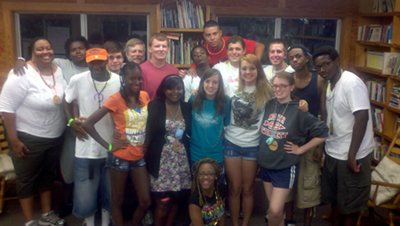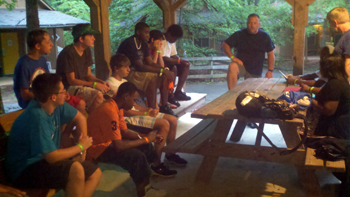Leaders in Training Ask: How Often do You Wear Your MedicAlert®?
Horizons in Hemophilia, October 2011
By Deniece Chevannes, Health Educator and the 2011 Leaders in Training
|
|
How often do you wear your MedicAlert®? That was the first question HoG’s Leaders in Training asked when they conducted focus groups at Camp Wannaklot.
Continuing on the work they started at Georgia Teen Institute this summer, HoG’s Leaders in Training worked diligently to discover ways to encourage teens to wear emergency medical identification.
During special training sessions at Camp Wannaklot, the Leaders In Training (LITs) learned how to conduct focus groups, write effective interview questions and use social media to spread their message. After the training ended their real work began. The LITs spread out all over Camp Wannaklot to conduct focus groups with teens and panel interviews with nurses.
Armed with the questions they developed during the training sessions, the LITs jumped right in and asked their first question: How often do you wear your MedicAlert®? Of the teens that attended camp this summer only 30% reported always wearing their emergency medical identification.
When asked by the LITs “What are some reasons teens do not wear their MedicAlert®?” more than 90% of the focus group participants stated that they “did not want people to know…about their bleeding disorder.” Others said they were teased because they wear their emergency medical identification and they did not want to feel different than their friends who don’t have bleeding disorders.“Participating in the LIT dimensions taught me how to be a leader. I learned how to get information across and how to talk to people about my bleeding disorder.” |
| “My experience doing the focus group was fun and informing. The teens we interviewed gave plenty of opinions. After doing the focus group it gave me a reason to wear my Medic Alert® more often.” --HoG Leader in Training |
The LITs also interviewed a panel of nurses to learn how to encourage teens to wear their emergency medical identification. The nurses explained that wearing your MedicAlert® can save your life during an emergency; “It-- MedicAlert®-- speaks for you when you can’t during an emergency. It can help emergency medical personnel know how to treat you and what type of factor to give you.” The nurses also gave the LITs great tips on how to help teens explain their bleeding disorders to others.
Check out HoG’s Facebook page to read more about the work the LITs did at camp and tell us: how often do you wear your MedicAlert®?


